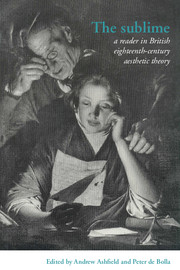Book contents
- Frontmatter
- Contents
- List of Abbreviations
- Introduction
- Part I The Longinian tradition
- Part II Rhapsody to rhetoric
- Part III Irish Perspectives
- Part IV The Aberdonian Enlightenment
- 28 An enquiry into the life and writings of Homer (1735)
- 29 Theodorus: a dialogue concerning the art of preaching (1752)
- 30 An essay on taste (1759)
- 31 An essay on original genius (1767)
- 32 Essays on the intellectual powers of man (1785)
- 33 Dissertations moral and critical (1783)
- Part V Edinburgh and Glasgow
- Part VI From the Picturesque to the Political
- Sources and further reading
32 - Essays on the intellectual powers of man (1785)
Published online by Cambridge University Press: 05 June 2012
- Frontmatter
- Contents
- List of Abbreviations
- Introduction
- Part I The Longinian tradition
- Part II Rhapsody to rhetoric
- Part III Irish Perspectives
- Part IV The Aberdonian Enlightenment
- 28 An enquiry into the life and writings of Homer (1735)
- 29 Theodorus: a dialogue concerning the art of preaching (1752)
- 30 An essay on taste (1759)
- 31 An essay on original genius (1767)
- 32 Essays on the intellectual powers of man (1785)
- 33 Dissertations moral and critical (1783)
- Part V Edinburgh and Glasgow
- Part VI From the Picturesque to the Political
- Sources and further reading
Summary
Essay VIII. Of taste
Chapter III. Of grandeur
… In the contemplation of uncommon excellence, the mind feels a noble enthusiasm, which disposes it to the imitation of what it admires.
When we contemplate the character of Cato, his greatness of soul, his superiority to pleasure, to toil, and to danger, his ardent zeal for the liberty of his country; when we see him standing unmoved in misfortunes, the last pillar of the liberty of Rome, and falling nobly in his country's ruin, who would not wish to be Cato rather than Cassar in all his triumph?
Such a spectacle of a great soul struggling with misfortune, Seneca thought not unworthy of the attention of Jupiter himself, “Ecce spectaculum Deo dignum, ad quod respiciat Jupiter suo operi intentus vir fortis cum mala fortuna compositus.”
As the Deity is of all objects of thought the most grand, the descriptions given in holy writ of his attributes and works, even when clothed in simple expression, are acknowledged to be sublime. The expression of Moses, “And God said, let there be light, and there was light,” has not escaped the notice of Longinus, a heathen critic, as an example of the sublime.
What we call sublime in description, or in speech of any kind, is a proper expression of the admiration and enthusiasm which the subject produces in the mind of the speaker.
- Type
- Chapter
- Information
- The SublimeA Reader in British Eighteenth-Century Aesthetic Theory, pp. 178 - 179Publisher: Cambridge University PressPrint publication year: 1996



